How a hyperlocal logistics network created 'early morning delivery' for less than $1000
🍱 Reading this article will let you know:
- For e-commerce business owners who are primarily using courier services to deliver products to customers' homes, you're likely paying at least 2000~3000 won per shipment, depending on the volume and nature of the goods. But what if I told you that there's a company operating a 'dawn delivery' service faster than regular courier services for less than 1000 won? And what if they achieved this with just a monthly shipment volume of 30,000? We've uncovered the secret behind this pricing strategy from Kim Taekoo, COO of 'Front Door Market.'
- 'Front Door Market' operates an online shopping mall called 'Front Door Kitchen,' selling side dishes, salads, and soups. However, their operation method significantly differs from typical fresh food specialty malls. 'Front Door Kitchen' sells a limited number of about ten products exclusively through a 'subscription' model, leading to cost savings and increased customer service benefits. We explored their secret to achieving an impressive 80% repurchase rate while reducing operational costs.
- Another unique aspect of 'Front Door Market' is that they don't operate in the Seoul metropolitan area, where about 70% of e-commerce demand is concentrated. Initially based in Jinju, Gyeongsangnam-do, and primarily serving the Gyeongsangnam-do region, including Jinju, Changwon, Geoje, and Busan, they have recently expanded to Daegu in Gyeongsangbuk-do. This limited service area was crucial in achieving their incredibly low-cost dawn delivery. We delved into the reasons behind their ability to offer dawn delivery in Jinju for as low as 850 won.
- While 'Front Door Market's approach is conservative, it is also stable. Despite dealing with perishable fresh foods, they are already operating profitably, surpassing their monthly break-even point. However, as those in the industry might guess, their business model has significant limitations in terms of scalability. How will 'Front Door Market' overcome this challenge? They have already initiated one method and plan to start another.
CHAPTER 1
What’s Your Courier Service Cost?
For those of you running an e-commerce business, you're likely using courier services to deliver products to customers' homes. How much are you paying per shipment? While this may vary based on the volume of goods and the nature of the products, it's estimated that for small packages, the courier fee ranges from the late 1000s to the early 3000s in won.
Now, what if you used a faster 'dawn delivery' service instead of regular courier services? We inquired about the per-shipment cost from logistics practitioners in the e-commerce industry who have experience with dawn delivery. Although the cost varies depending on the volume and nature of the goods and the policies of the logistics company, we found that for 'Team Fresh', a dawn delivery specialist, the price is set in the early to mid-3000s won range. Team Fresh operates a policy where up to three boxes shipped from the same location are treated as one shipment, so the actual cost per box could be slightly lower.
Regardless, whether it's regular courier or dawn delivery, businesses have to bear the cost of over 2000~3000 won per shipment. But what if there were a company offering dawn delivery services for less than 1000 won? It might seem unbelievable, especially if the logistics company's rates are significantly reduced. This company achieved it by building and operating its own 'dawn delivery network.'
The company is called 'Front Door Market'. They operate an online shopping mall 'Front Door Kitchen', based in a food factory in Jinju, Gyeongsangnam-do, selling side dishes, salads, and soups. All products sold by Front Door Kitchen are delivered to the customer's doorstep by 7 am through a 100% free dawn delivery service. The aforementioned 1000 won is the average cost per dawn delivery, and in some areas, the cost has been reduced to as low as 850 won.
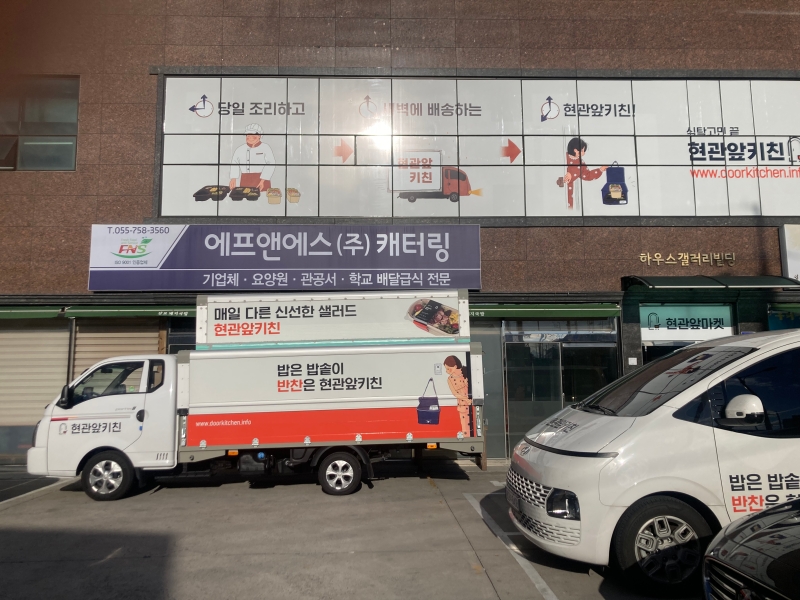
The success of Front Door Kitchen in attracting customers with its 'free dawn delivery' policy seems to be significantly influenced by the reduced delivery cost per shipment, brought down to less than 1000 won. Based on these low logistics costs, they are already operating profitably, surpassing their monthly break-even point.
How was a newly established company, which only started its services in April 2022, able to operate this service at such a cost? Especially considering that Front Door Market’s 2023 revenue was around 2 billion won, with a monthly shipment volume of about 30,000 as of December 2023, which is not a high volume of goods handled. Connectors met with Kim Taekoo, COO (Chief Operation Officer) and founder of Front Door Market, to uncover this secret.
CHAPTER 2
Unconventional Assortment and Sales Strategy
To start off, it's important to clarify that the calculation of Front Door Market's average dawn delivery cost excludes expenses related to logistics tasks like packaging and line-haul transportation costs prior to shipment. In simpler terms, the cost calculation is based on reverse-engineering the total expenditure on 'delivery personnel' against the number of deliveries handled by Front Door Market. Even considering this, the dawn delivery cost of 1000 won still felt remarkably low. To understand this secret, one must first be aware that 'Front Door Kitchen' operates with a product assortment and sales strategy that differs from typical online shopping malls.
If you visit the 'Front Door Kitchen' website right now, you will encounter a rather unconventional interface. Unlike typical fresh food online malls like Market Kurly or Oasis Market, which offer thousands to tens of thousands of various products, Front Door Kitchen presents a strikingly different approach. You will notice that the number of products available for purchase on their platform is less than ten. This limited product range is a deliberate strategy, contrasting sharply with the vast assortments offered by most e-commerce platforms.
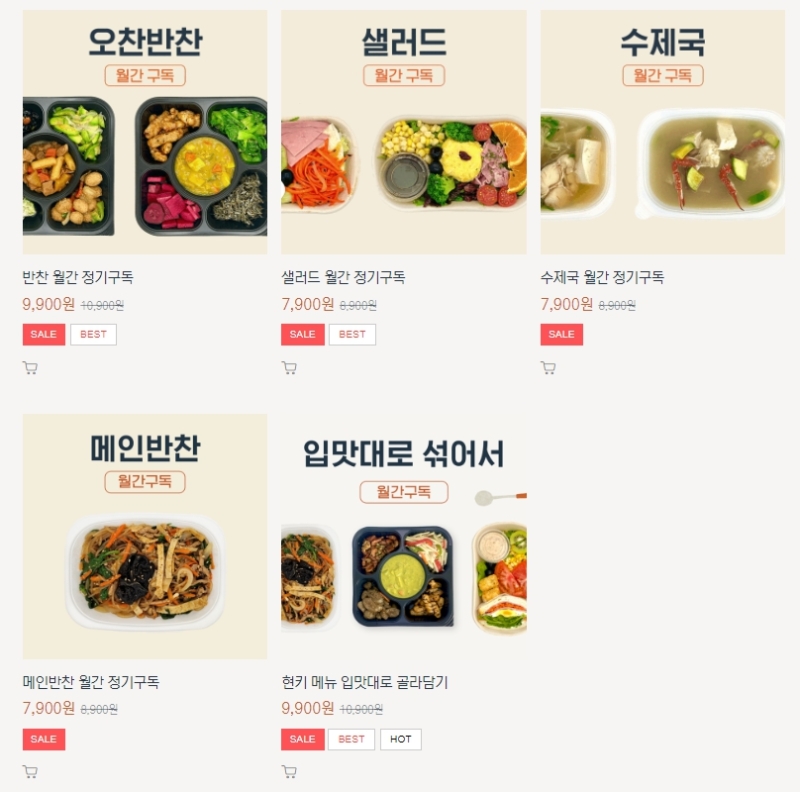
The reason for this is that Front Door Kitchen sells all its products through a 'regular subscription' model. Customers of Front Door Kitchen can purchase subscription services for side dishes, salads, and soups on a daily trial, weekly, monthly, or annual basis. For weekly subscriptions, customers can choose the days of delivery (Monday to Friday) and the frequency.
For instance, if a customer subscribes to a weekly delivery service (Monday, Wednesday, Friday) for monthly side dishes, the subscribed products will be delivered by 7 am on each of those days every week. Unless the subscription is canceled, the total amount for the monthly delivery frequency will be automatically charged for the next month.
One might wonder if the side dishes, homemade soups, or salads delivered on the chosen days are randomly selected like in a 'mystery box'. However, Front Door Kitchen provides a 'menu plan' to its customers every month. Thus, customers can view the pre-announced menu plan and set their preferred delivery days based on the products they wish to purchase. While there might be some inconvenience, it’s not impossible to purchase fixed items.
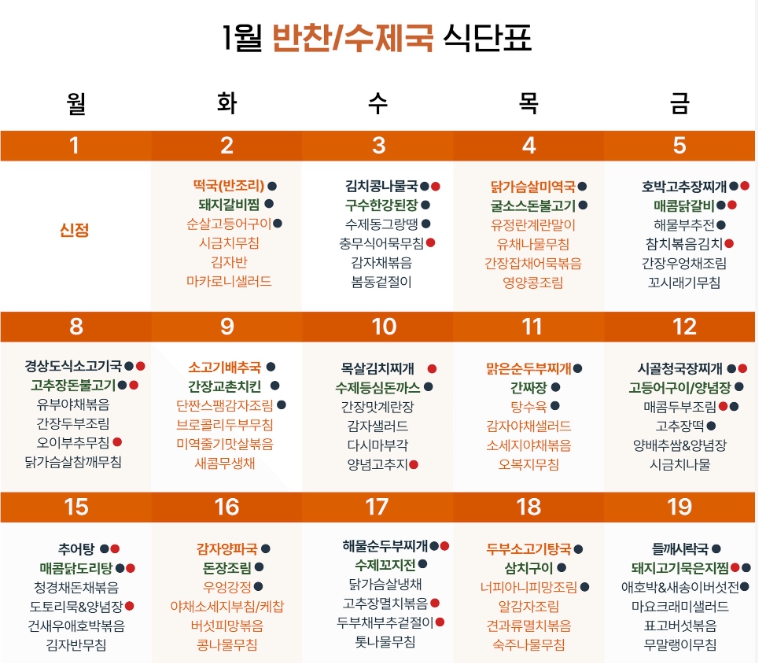
CHAPTER 3
The Business Transformation Created by 'Regular Subscription = Demand Certainty'
The reason why Front Door Kitchen adopts a sales strategy centered around 'regular subscriptions' is clear. One of the eternal challenges in fresh food is 'inventory management'. With short shelf lives, rotating stock before it goes to waste is not an easy task. Disposal directly translates to losses greater than the cost of goods for businesses, leading them to sell fresh foods at drastically reduced prices to minimize these losses (think of end-of-day sales at supermarkets).
However, by selling products through regular subscriptions, demand can be confirmed before sales begin. The factory can prepare its cooking staff and production lines based on the confirmed demand and the menu plan. This approach enables operations that minimize wastage and losses. This utility has made regular subscriptions a strategy employed by many e-commerce companies dealing with fresh foods. Numerous companies introduced in the Connectors content have utilized regular subscriptions to optimize costs, becoming exemplary cases in this regard.
Moreover, the ability to confirm demand in advance contributes not only to reducing wastage but also to lowering the production costs at the factory. By preparing ingredients and labor in line with the demand for each day of the week, unnecessary expenses in wages and raw materials can be minimized. Front Door Market has already been employing this strategy, optimizing their factory operation rate based on confirmed demand. This approach significantly enhances operational efficiency, leading to cost savings and improved profitability.
"By operating our service in a regular subscription format where customers choose the days they wish to receive their deliveries, Front Door Kitchen customers typically select delivery days in an alternate-day pattern. For instance, those who opt for three deliveries a week usually choose 'Monday, Wednesday, Friday,' while those preferring twice a week go for 'Tuesday, Thursday.' Notably, a significant proportion of customers choose 'Monday, Wednesday, Friday' deliveries.
This pattern of choosing certain days more than others can lead to imbalances in daily orders, potentially decreasing factory line efficiency and increasing production costs. So, we tried adjusting the menu to place popular side dishes on Tuesdays and Thursdays. This change led to an increase in orders for these days, improving the balance with 'Monday, Wednesday, Friday' orders by about 15%.
Moreover, Friday has the lowest number of orders. We addressed this imbalance through another product category we offer, 'Yu Jeong Bang San,' in addition to our subscriptions for side dishes, salads, and soups. 'Yu Jeong Bang San' can be purchased as single items or through a subscription. We made it so that delivery days for these products could only be set for 'Tuesday' and 'Friday,' the days with relatively fewer orders." - Kim Taekoo, COO and CSO of Front Door Market.
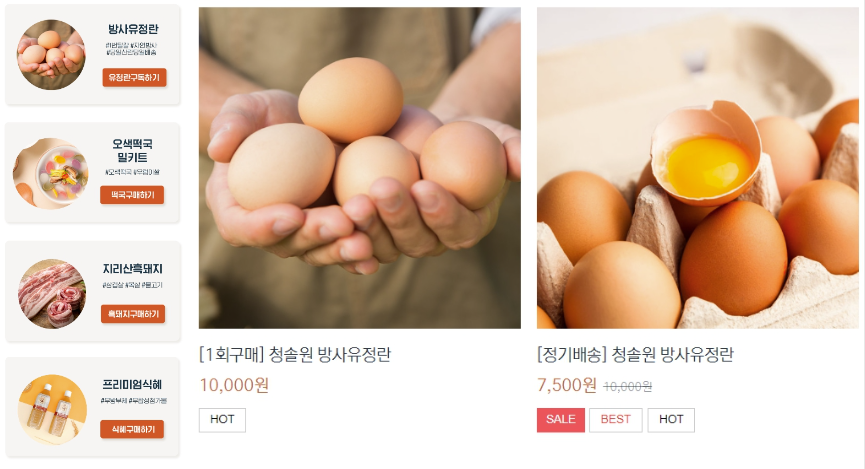
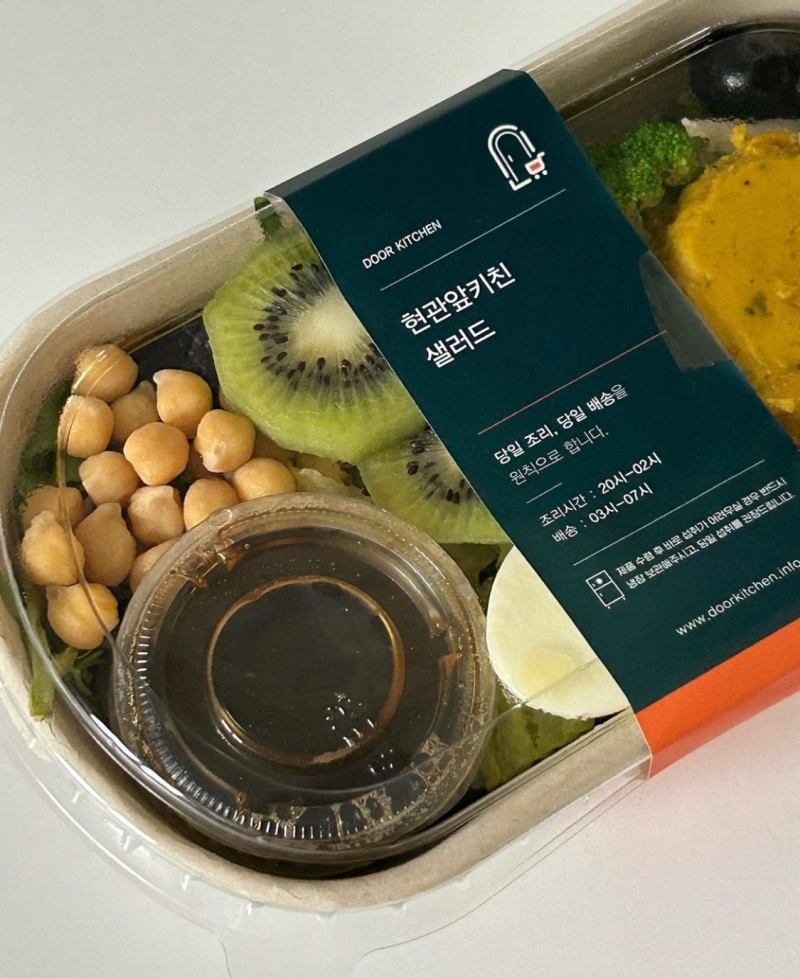
Additionally, Front Door Market explains that 'regular subscription' is a meaningful strategy from the customer's perspective. Since they do not operate with inventory on hand, they can deliver fresh food prepared on the same day to the customer by the next dawn. This approach ensures maximum freshness for their products, aligning with the increasing customer demand for fresh, high-quality food items delivered conveniently.
Front Door Market conducts production from 12 PM to 7 PM the day before delivery, aligned with the regular subscription demands and the menu plan. The products, once packaged, are dispatched for line-haul transportation around 10 PM or 11 PM. These products are then transported to the nearest logistics hub in the delivery area, where local delivery personnel pick them up and deliver them to customers by 7 AM. This process ensures that customers receive extremely fresh food, prepared less than 24 hours before delivery.
"Our customers who have tried our salads simply can't switch to another provider. The reason lies in the nature of the vegetables used in salads, which begin to age rapidly from the moment they are harvested. Even with refrigeration, there's a limit to slowing this process. We operate our service by completing the manufacturing and delivery of salads within 24 hours of harvesting, based on the confirmed demand secured through our regular subscription. The typical sourcing and courier delivery processes just can't achieve this structure of delivering products made on the same day within 24 hours.
On a slightly different note, the free-range eggs we purchase and sell at Front Door Kitchen are marketed under the name 'Oeilan', emphasizing they are fresh 'number 1 eggs' laid today. We collect eggs from the farm by 12 PM, and they arrive at our Jinju factory by 7 AM the next day. This allows us to deliver them by 7 AM the following morning. While department stores also sell free-range eggs, they usually sell eggs that are about two weeks old. We have negotiated with the farmers to supply only eggs laid on the same day, albeit at a slightly higher procurement price. Leveraging our dawn delivery network, we can deliver eggs laid today to customers before 24 hours have passed." - Kim Taekoo, COO and CSO of Front Door Market.
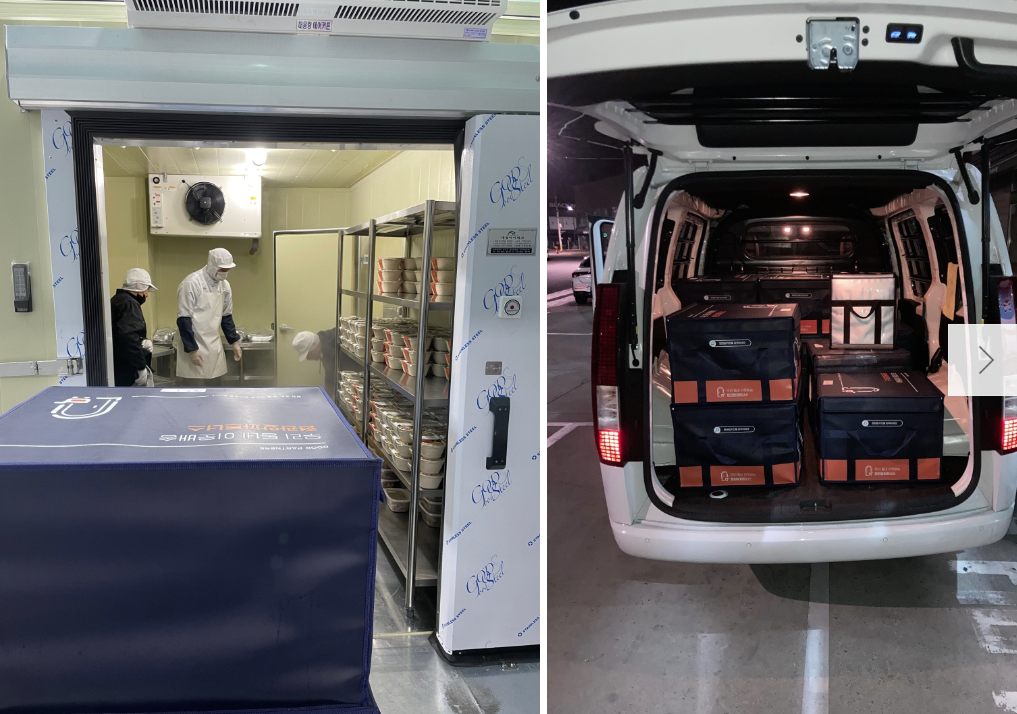
CHAPTER 4
Hyperlocal Logistics Expansion Method
The strategy of Front Door Kitchen to minimize operating costs from the production stage is also reflected in their 'logistics expansion method.' Currently, Front Door Kitchen does not operate a nationwide delivery service. They started their business in the Gyeongsangnam-do region, including Jinju, Sacheon, Changwon, Tongyeong, Gimhae, Yangsan, Geoje, and Busan. Only recently, they expanded their service area to include Daegu Metropolitan City. Moreover, not every area within these regions is eligible for delivery; each region has designated 'non-delivery areas.' This hyperlocal approach to logistics helps the company maintain efficiency and manage costs effectively by focusing on specific, manageable areas.
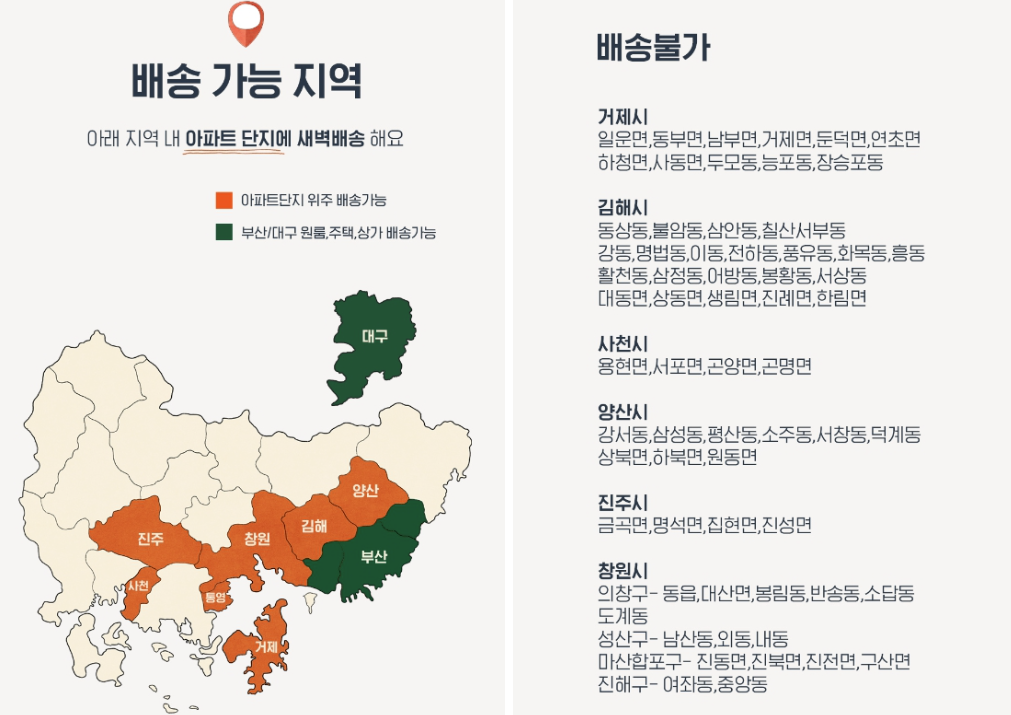
Front Door Market intentionally focuses on increasing 'delivery density' to achieve an average dawn delivery cost of about 1000 won. They believe that while offering nationwide service could quickly expand sales, it would also incur high logistics costs due to inefficiencies until a certain level of demand accumulates.
Therefore, Front Door Market began by creating delivery areas with high density, focusing on apartment complexes. Their specific approach includes:
Subscription Interest Collection: Before expanding to new service areas, Front Door Kitchen conducts a pre-registration for potential subscribers. If around 300 interested subscribers are gathered, they start advertising for delivery personnel in that area. Front Door Kitchen operates a network of ordinary drivers for delivery through crowdsourcing. Most of these drivers are local residents looking for part-time work.
Delivery Personnel Operation: A typical Front Door Kitchen delivery person works about 2 hours per day, covering an average of 40 households, or 1.8 times the number of households in product numbers. In high-density areas, there have been cases of delivering to up to 80 households. The average monthly salary for a delivery person is about 650,000 won. They set a basic wage of 20,000 won per day, with an additional incentive of 1,000 won per delivery for exceeding a certain number of deliveries (20), and the salary is settled on a monthly basis.
As the Units per Hour (UPH) handled by each delivery person increases, the delivery cost per unit decreases. Since Front Door Kitchen increases its delivery staff based on 'anticipated demand,' they can start work with a certain level of delivery density already established. While initially, in new expansion areas, the cost per dawn delivery can reach up to 1500-1600 won, this amount gradually decreases as density increases. In areas like Jinju, dawn delivery operation becomes possible at as low as 850 won per delivery.
"There's a reason why we only operate dawn deliveries. Many of our delivery drivers work these shifts as a side job after finishing their main daytime jobs. To recruit them, we had to avoid daytime delivery hours, which would conflict with their primary employment.
Additionally, dawn deliveries have the advantage of taking place during times of low traffic, reducing factors that could impact the number of deliveries per hour. If these drivers work more than 3 hours, it could interfere with their main daytime jobs. That's why we assign them a volume of work that can be completed in an average of about 2 hours." - Kim Taekoo, COO and CSO of Front Door Market.
In cases where a delivery person unexpectedly cannot come to work, Front Door Kitchen faces operational challenges since they do not employ delivery drivers directly. This can result in 'no-show' issues.
For situations like these, emergency dispatch is necessary to ensure deliveries are made on time to customers. Front Door Market operates a KakaoTalk chat room for those who have ever worked for them. They first inform these individuals about available work and recruit delivery personnel who can immediately take on the task. In such emergency situations, the compensation paid to the delivery staff is understandably higher than usual, ranging between 2000 to 3000 won.
If no personnel are available immediately, Front Door Market may resort to a partnered quick service company, at an approximate cost of 3500 won per delivery. If dispatch is still not possible, as a last resort, Front Door Market’s own staff intervene. They operate three line-haul vehicles that transport goods from the Jinju factory to various regional pickup points for delivery personnel. In urgent situations, these vehicles, after completing their line-haul tasks, can also be deployed for deliveries.
Chapter 5
Expansion Method for Logistics Without a Distribution Center
As previously explained, the role of 'delivery hubs' naturally emerged during the discussion about trunk transportation. It's mentioned that a single trunk transportation vehicle can typically accommodate around 1,400 side dish orders. The drivers in charge of trunk transportation are responsible for delivering these orders to each 'delivery hub' operated by Front Door Kitchen, conducting a milk run delivery service.
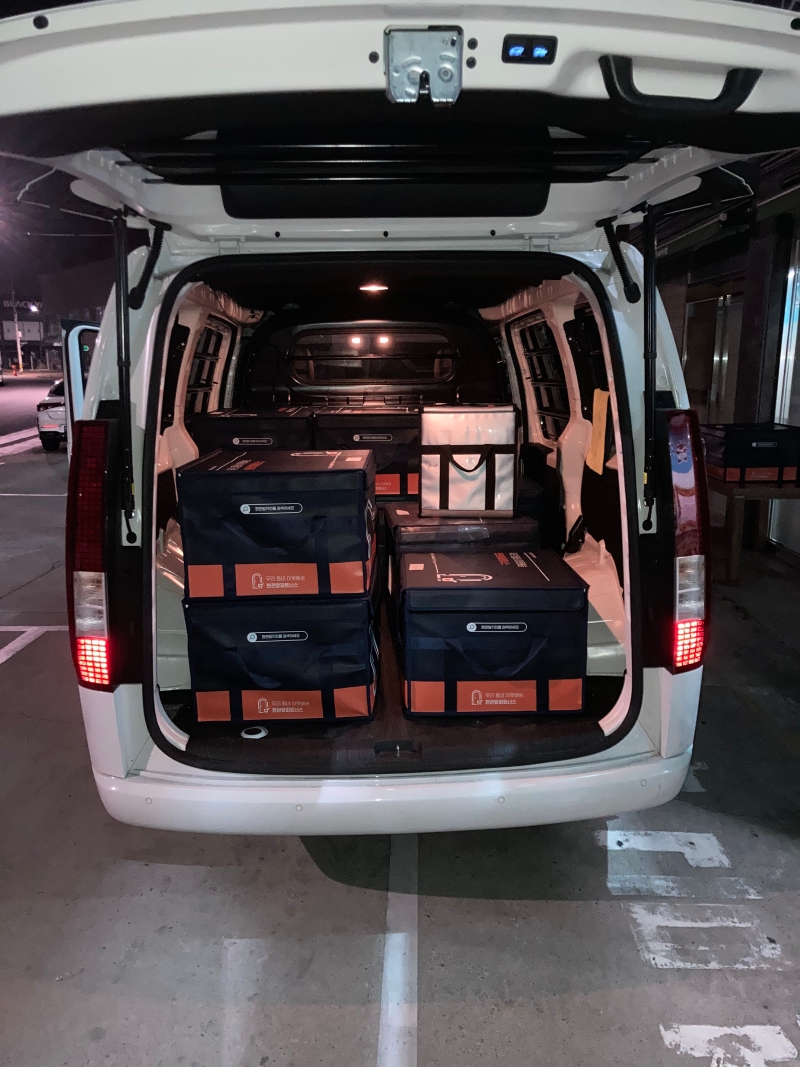
Certainly, theft could be a concern. If the prepared dishes and salads are left in cooling boxes in the underground parking lot of an apartment complex, there's a risk that someone might take them. However, Front Door Market operates a 'non-face-to-face' service method, where the trunk transportation driver leaves the outboxes in a specific area of the parking lot near the delivery person's residence. The delivery personnel then pick up these packages later. Previously, the products were handed over face-to-face, but this approach significantly reduced the efficiency of the trunk transportation, prompting the shift to a non-face-to-face system.
While there might still be concerns about theft with the non-face-to-face product handover method, there are a few mitigating factors. Firstly, the deliveries are made during the early hours of the morning when there are fewer people around. Additionally, as the items delivered by Front Door Kitchen are not high-value goods but rather side dishes and salads, there have been no instances of theft attempts reported. Although there aren't any special security measures in place at the moment, Front Door Kitchen plans to develop and deploy smart thermal boxes equipped with locking mechanisms to further secure the products.
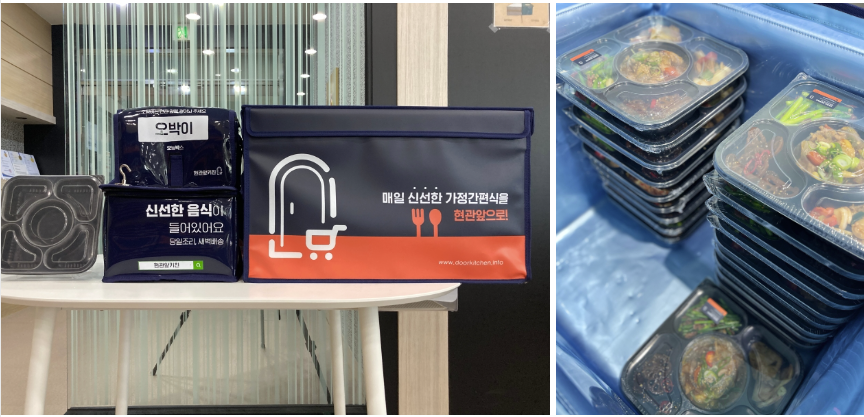
“We call our apartment delivery hubs 'hubs'. I saw an article on Connectors where the logistics industry seems to refer to them as TC (Transfer Centers). Since our intercity transport vehicles and delivery vehicles are connected non-face-to-face, it seems appropriate to call it a Transfer Car” - Kim Tae-goo, COO and CSO of Front Door Market.
Chapter 6
Can the Expansion Challenges be Overcome?
The logistics expansion methodology of Front Door Kitchen is quite conservative, yet it's also highly efficient. By focusing on a limited number of SKUs (Stock Keeping Units) and relying on regular subscriptions, it effectively controls the significant variability, which has always been a major challenge in e-commerce logistics. Operating the logistics network based on the pre-determined demand in a limited hyperlocal area makes it cost-effective. Despite managing a relatively modest volume of 30,000 shipments per month, Front Door Kitchen has been able to offer early morning delivery services at an average cost of 1,000 won, thanks to this background.
As the company continues to expand its services and SKUs, it's clear that the logistical challenges will increase as it expands, and as the company considers expanding its service area, the result may be a decrease in delivery density and a loss of the logistical efficiencies that the company was so confident in.
Chapter 7
Asset-Light Logistics Expansion and Hyperlocal 3PL
Front Door Market is aware of these risks and is considering cost-effective ways to expand its services. Firstly, in terms of expanding service areas, they plan to minimize asset investment by using a 'franchise' model. For example, the recently expanded service area in Daegu operates under a consignment franchise model. The Daegu franchise consolidates the goods produced at the Jinju factory and carries out line-haul transportation to various delivery hubs in Daegu. The final last-mile delivery is also managed by the Daegu franchise.
This arrangement means that a portion of the sales revenue from the Daegu area is shared with the franchise owner. While Front Door Market retains control over the 'products' and 'sales channels', logistics operations represented by line-haul transportation are entrusted to local operators to hedge against rising costs.
As expansion into new areas and sales volumes increase, new production facilities will become necessary. The location of these plants is critical, connecting directly to line-haul transportation costs and time. Front Door Market is exploring locations for additional plants, extending beyond its nearly fully operational Jinju factory.
Secondly, from a business perspective, Front Door Market is preparing for further expansion. Although they have reduced early morning delivery costs to 1,000 won, logistics remain a 'cost' element for customer service. They are now considering transforming this into a revenue-generating model. Yes, as you might guess, Front Door Market is preparing to open its logistics network to external companies, offering third-party logistics (3PL) services, termed 'Hyperlocal 3PL'.
Especially, Front Door Market is eyeing 'local champions' in the areas where they have expanded their early morning delivery service. Local businesses producing homemade baby food, restaurants developing meal kits, and stores manufacturing side dishes typically deliver directly to customers or use courier services. Front Door Market plans to offer them competitively priced early morning delivery services. The influx of additional external volumes is expected to further increase delivery density, reducing logistics costs.
"We plan to provide logistics services under the name 'Front Door Partners' to well-known local stores. Our market research shows that there are local champions in each neighborhood who make and sell homemade baby food, with about 30% offering delivery services. However, parents want to feed their children fresh, refrigerated baby food, and delivery via courier services doesn't guarantee freshness.
There are also many popular side dish stores in each area. They take orders through communities like Naver Band and offer delivery via quick service for orders over 50,000 won. However, side dishes tend to lose their taste after four days, leading to waste.
We can offer these businesses a hyperlocal logistics service optimized for fresh food and subscription services. For instance, if they pay a reasonable delivery fee of about 2,000 won, they can have their freshly made baby food delivered every morning. If a store produces homemade baby food and leaves it at their doorstep by 9 PM, we can pick it up and deliver it. We believe this can attract local leaders to our logistics services. We think system readiness is essential for conducting third-party logistics including other companies' products, so we plan to start developing it this year." - Kim Taegu, COO of Front Door Market.
According to COO Kim Taegu, Front Door Market had two principles in mind when creating their logistics network: creating a system suitable for fresh food subscription services and entering the market targeting apartment complexes to enhance delivery density. This logistics network, built on these principles, may have limitations in delivering various products, but it is competitive in delivering quickly, accurately, and inexpensively. Now, with the expansion of service areas and the combination of franchise logistics networks, they are preparing for an extension into 3PL.
Front Door Market, which has designed its business around localities and has a strong local presence, is distinct from the capital-intensive e-commerce giants. They are now considering expanding their service areas to Seoul and the metropolitan region. It will be interesting to see how this small company's challenge evolves and hope it serves as a hint for your business.
Written by Um Ji-yong. He is the co-CEO of BEYONDX and also serves as the Head of Content Operations at CONNECTUS.
If you wish to establish business connections with the hyperlocal commerce company 'Front Door Market', please contact us at cs@beyondx.ai.



